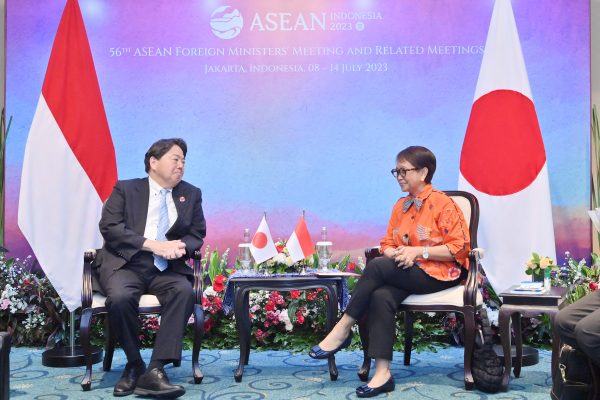Japan became the world’s second-largest economy in the late 1960s, establishing a formidable economic presence in Southeast Asia. Japanese companies exported industrialised goods and established business operations across the region. For the founding members of ASEAN — Indonesia, Malaysia, the Philippines, Singapore and Thailand — industrialisation was still a future project. Japan leveraged its economic power for political influence, providing considerable aid to Southeast Asian countries.
Japan’s early economic presence in Southeast Asia elicited a backlash in ASEAN countries. The ‘equal’ partnership that the Fukuda doctrine of the late 1970s emphasised did not then represent the reality of Japan–ASEAN relations.
As Japan’s status has diminished, ASEAN’s economic and political status has grown, elevating Southeast Asian interests globally. ASEAN combined GDP reached about US$3.6 trillion in 2022 — 85 per cent of that of Japan — and the region’s on a strong growth trajectory.
Both ASEAN and Japan now face new external challenges. After the end of the Cold War, East Asia enjoyed a stable regional environment under the liberal international order sustained by US hegemony. This stability is now threatened by a changing power balance and escalating US–China strategic competition. Navigating these power dynamics is complex, and neither Japan nor ASEAN countries can simply choose one side or the other.
The alliance with the United States is the core of Japan’s defence and foreign policy strategies. The 2022 National Security Strategy prioritises cooperation with the United States towards long-term peace and security in the region. As US–China competition intensifies, this has implications for Japan–China security relations, already fraught by territorial disputes over the Senkaku/Diayuo Islands and natural resources in the East China Sea. Yet the Chinese economy remains crucial for Japanese businesses. China is Japan’s largest trading partner and was the third-largest destination for Japanese direct investment in 2022.
For ASEAN, China’s assertive behaviour in the South China Sea threatens the free and open, rules-based maritime order in the region. Escalating US–China strategic competition challenges ASEAN’s ‘centrality’ while the emergence of minilateral strategic coalitions such as the Quad and AUKUS diminish the importance of ASEAN’s contributions to regional stability.
At the same time, the ASEAN and Chinese economies have also become inseparably intertwined. The share of ASEAN’s total trade with China grew from 12 per cent in 2010 to 19.4 per cent in 2020, ASEAN as a group is China’s largest trade partner and foreign direct investment from China into ASEAN is steadily increasing.
For ASEAN countries, the United States remains important as a trading partner as well as its largest source of investment. Some ASEAN countries cooperate closely with the United States in security and defence. The Philippines and Singapore lease bases to the US military and — with Brunei, Indonesia, Malaysia, Thailand and Vietnam — participate in annual Southeast Asia Cooperation and Training exercises led by the US navy.
As US–China competition intensifies, both powers are strengthening the economic security dimensions of policy. The Japanese policy elite acknowledges that the existing liberal international order under US hegemony is on the wane, and Japan has begun to adopt a new approach, assuming a role as promoter of the rules-based regional order. The proposal of the ‘Free and Open Indo-Pacific’ is one case in point. Like ASEAN, Japan also accepts that it does not have sufficient power to foster and sustain such a regional order alone.
Though the interests and objectives of Japan and ASEAN on specific issues don’t always coincide, they need to enhance cooperation because both need partners to foster a stable regional order and deal with national challenges. They need to ensure their diplomatic autonomy and maintain their voice to protect against the whims of great power rivalries.
There are three main pillars on which Japan and ASEAN can now build that cooperation.
The first is a commitment to a free, open, rules-based and fair regional order by enhancing defence and security cooperation, particularly maritime cooperation under the ASEAN Outlook on Indo-Pacific and Japan’s Free and Open Indo-Pacific. ASEAN countries such as the Philippines and Vietnam are improving the capacity of their coast guards through Japanese aid. Japan has also held 2+2 meetings with Indonesia and the Philippines and concluded defence equipment transfer agreements with several ASEAN members, including the Philippines, Malaysia, Vietnam, Thailand and Indonesia.
The second pillar is around the shared goals of economic development and equity. Japan demonstrated its commitment to strengthening cooperation with ASEAN countries affected by the COVID-19 pandemic, providing US$2.5 billion in loans for financial assistance and establishing the ASEAN Centre for Public Health Emergencies and Emerging Diseases. Japan and ASEAN can also enhance supply chain resilience by strengthening free trade agreements such as the Comprehensive and Progressive Agreement for Trans-Pacific Partnership.
The third pillar is to foster mutual understanding and trust between ASEAN and Japan as ‘heart-to-heart partners’. Though the Abe administration strengthened cultural exchange between ASEAN and Japan, there is still need to build multilayered channels for mutual understanding, information-sharing and intellectual exchanges.
Though the domestic and regional circumstances of ASEAN and Japan have evolved over the past 50 years, they share many common challenges. As the regional order becomes more uncertain, the time is right for ASEAN and Japan to forge a new, equal partnership, based on defence and security cooperation, economic development with sustainability and equity and closer mutual understanding.
Mie Oba is Professor at the Faculty of Law at Kanagawa University, Yokohama.

